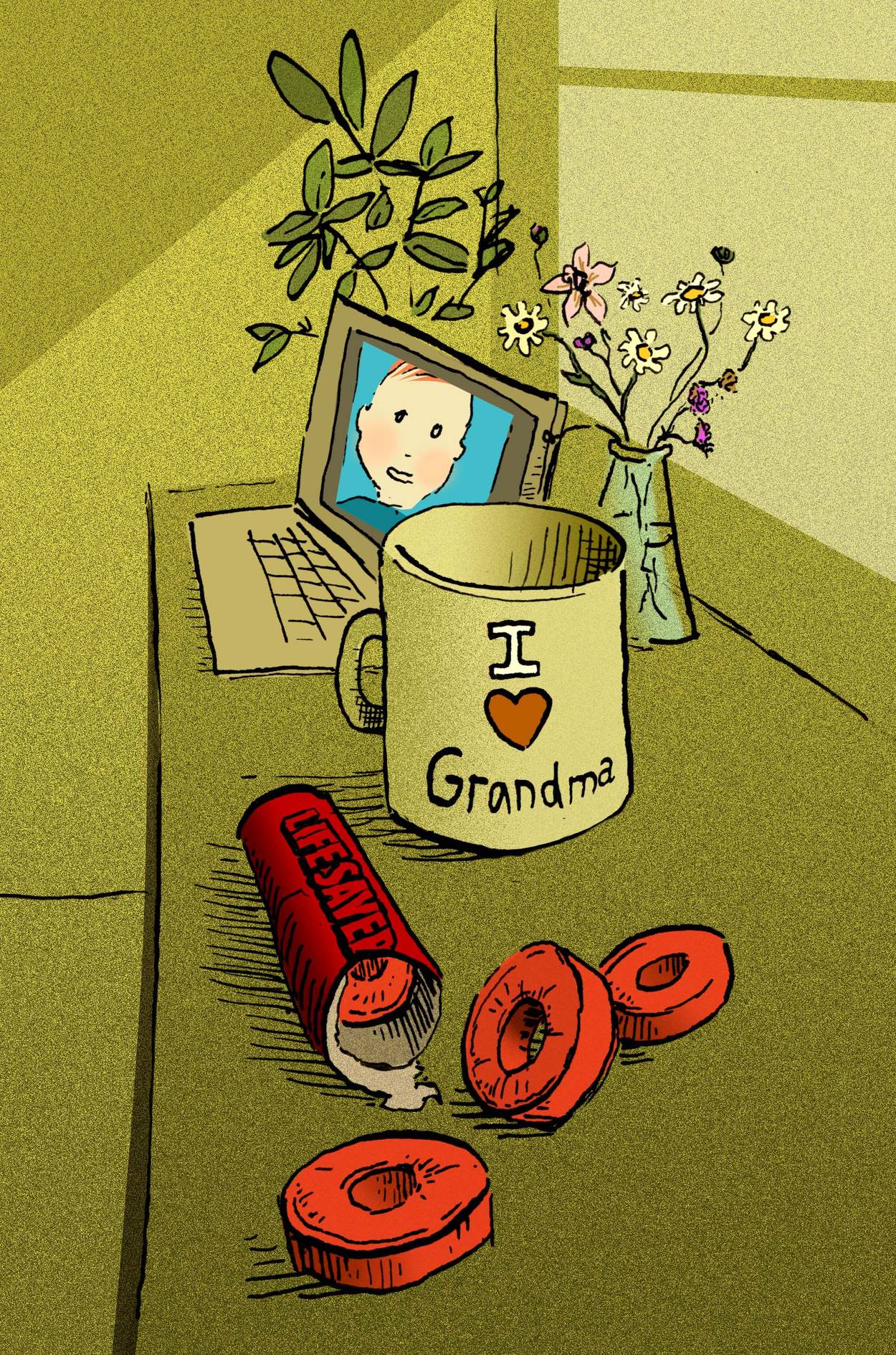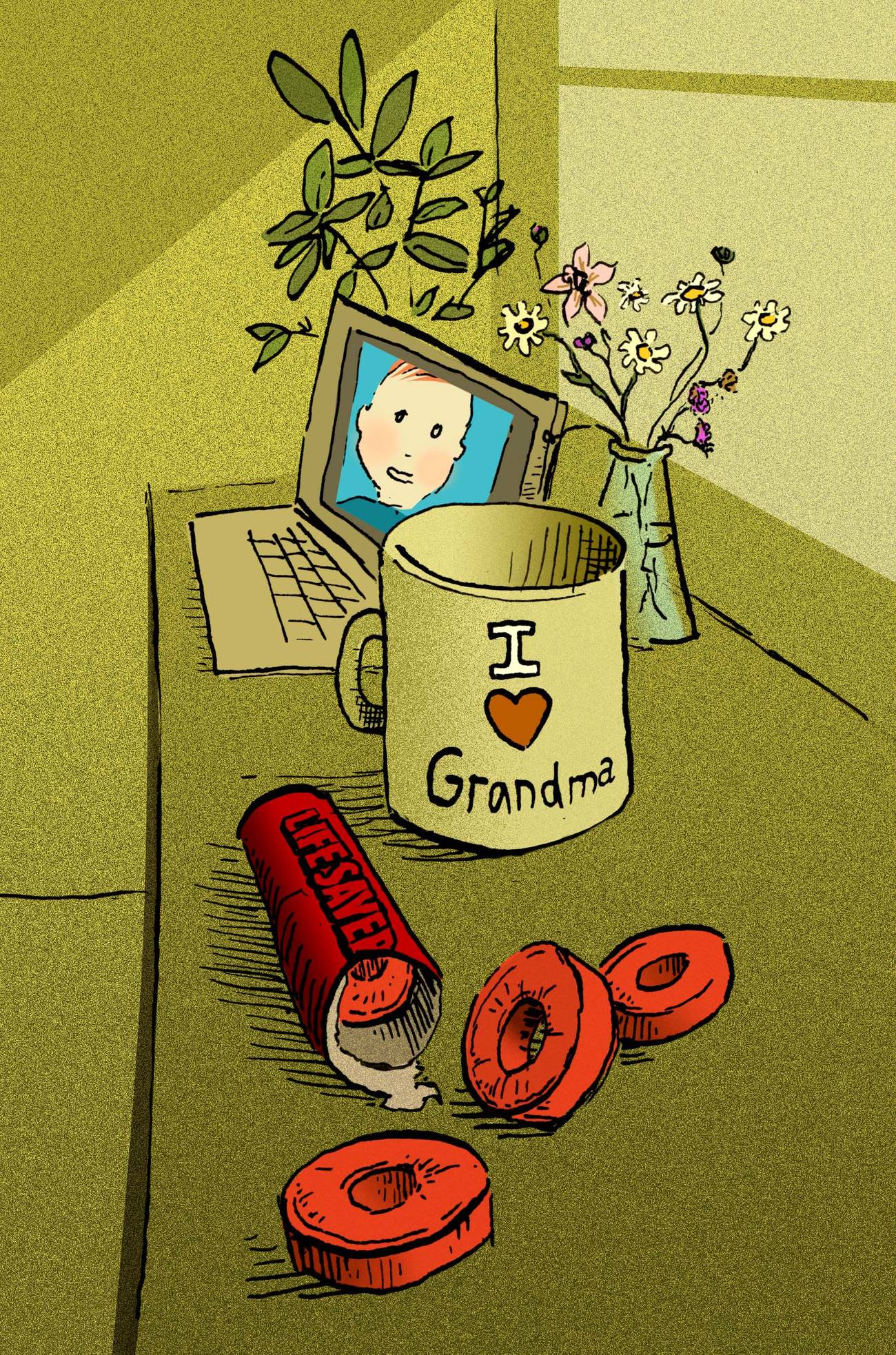The Crown of Grandparenting
Navigating the pandemic, separated from the ones we love




I was not one of those women who spent her days yearning to be a grandmother. Maybe that’s because my own was not a “cookie grandmother” who stuffed us with sweets and offered a bountiful lap. Grandma Ethel had been a beauty in her youth, with waist-length copper hair and sky blue eyes. She loved to tell us stories about herself, how she danced on tables in the 1920s. Grandma smiled too widely in family pictures, making things feel fake and unreal. She paled in comparison to my grandfather, whom I adored.
Every Sunday night our family endured interminable dinners at their house on Cornell in suburban St. Louis. Grandma soaked everything in orange juice—the chicken, the potatoes, the Jell-O. She and Grandpa shuffled back and forth from her tiny kitchen diligently waiting on us. She often paused to lean down, whispering at my shoulder: “Orange juice. It’s the secret ingredient.”
Afterward, she regaled us with “Zum Gali Gali,” and poppy seed cookies (orange juice!) baked to rock-hard perfection, just the way Grandpa liked them. She never seemed to notice the strange mixture of pleasure and pain on our faces as we ate them.
Into her 80s, Grandma loved swimming at the JCC pool, where my grandfather stood on deck, hawklike, lest another old Jewish guy in bathing trunks steal her away. In her last years, I lived blocks away from her with my young family in University City. When I visited her, never often enough, she held my sister’s Hallmarks aloft, “Look what your sister wrote me for Mother’s Day. Read it out loud.”
And so, perhaps because of my own grandmother, or maybe because at nearly 60 I felt mostly fulfilled teaching and writing and living within the communal bounties of New York’s Upper West Side, I tended to half-listen when friends described the enchantments of grandparenting. They were portraying some island I could dimly see out there, but I had no attraction to its depths or refuge.
Then I became a grandmother. When my granddaughter Rumi was born—in Brooklyn—a hundred of us gathered around an open Torah scroll as my son gently placed the baby, wrapped like a small gift, upon it. My daughter-in-law stood at the baby’s head, with me and my mother at her side, Mom’s lacquered nails jarring against the delicate Hebrew letters. Still, it hit me: We were three generations of women linked by this tradition, by this unfolding story, by our love for this new being arrived among us.
My son, who happens to be a rabbi, led us in a song, “Ahava Rabbah,” about being loved by an unending love, and somewhere in the call and response of that prayer, my heart seemed to break open a bit wider. It has never returned to its former state.
That’s what being a grandparent will do to you. So, surprising ourselves, Pops and I signed on for weekly sojourns to Brooklyn to babysit. We would ride up and over the Brooklyn Bridge, and on sterling days I would nod at the Statue of Liberty out there in the water, thinking of my Grandma Ethel and her own arrival here.
For the next four years, we beheld Rumi as she grew, marking the changes from week to week. Holding her as a small woodland creature, utterly content to fall asleep on my breast. Or as a toddler in the tub: her plump pink cheeks, her small hands clutching yellow cups as she poured water from one to the other and back again. Then, the beginnings of language, the effortful push of her lips around a new word, “pur-ple,” which had a pause in it so she could drive the second syllable out. The two of us would literally sit on the edge of the tub, staring at her with the same rapt attention I bring to Broadway musicals. Stunning ourselves with the force of our love.
During sleepovers, in a newfangled version we had never experienced as parents, Rumi joined us in our bed. We both occasionally squeezed an eye open to glance at her. She was still awake—staring out at the étagère, then up at the whirring of the fan, then a new trick: throwing her legs up in the air and down again with a bump that surprised and delighted her.
Pops was on the other side, his delight palpable, a shiny thing. Returned again, both of us, to some old versions of ourselves—a cocoon of love.
Then the pandemic hit. And in Zoom screen after Zoom screen, I listened as grandmothers, locked down plane rides away from their grandchildren, weighed in: “When will we see them again? When will I be able to give her a real hug?” In a coffee following a socially distanced swim class, yet another grandmother—this one with a wide grandmotherly bosom and a cap of wet black hair—said, “The real heartbreak of this thing is not being able to help my kids with the grandchildren.”
The loneliness of this time is leaving its mark on all of us, each generation in its own particular way. But we grandparents, some of us deeply aware of lesser years ahead, have been denied what our tradition in Proverbs calls “the crown of the aged.” The double vision—both immediate and distanced—that we bring to the task allows us to see things in a larger, perhaps wiser way.
When taking care of my grandchild, I often experience a purer, less harried form of joy than I ever did as a parent. It’s a feeling that lingers deep down, aligning with the knowledge that these young lives will continue into a future we ourselves will not see. Becoming a grandparent has made me more accepting of my own death.
One of the crucible moments of this pandemic, as death itself seems to hover closer, came about three months in. My son, quarantined with a pregnant wife and a 4-year-old who refused to Zoom preschool, stared into our screen. We had been sequestered vigorously and were only planning a stoop visit to them, but my son asked, “Would you be willing to do a sleepover?”
I told him we would need a night to think on it. I am someone who has found her deepest meaning and purpose within the raising of her children. And then, later in life I discovered a rekindling of that sense of mission—in babysitting my granddaughter.
So after a few sleepless hours, I called my son back to say, “of course.” A sleepover. Having endured three months of quarantine, Pops and Rumi and I wandered Central Park, newly awakened, Sleeping Beauty-like, to the beginnings of springtime and the new legions of birds around us. We danced beneath Belvedere Castle, which Rumi is convinced is Cinderella’s. There was a sunlit splash to it all: the real gravity of the pandemic thrumming beneath us, and yet here we had found light.
In addition, there was my son’s face when he dropped Rumi off, a mix of exhaustion, relief, and gratitude that doesn’t always come easily to him.
During this pandemic time, with our Wednesdays interrupted, experiencing so many weeks apart, it has become clear to me that something deep and ancient is called forth in our grandchildren’s presence. It is a timeless quality I found recently on a Friday night Zoom screen image of a siddur. In a series of alternative prayers, visualizations for the Amidah, our synagogue’s siddur invited us to “Step back in time. Feel your ancestors—your family, your tribe, the ancient humans standing at your side. What traditions do you keep in their honor? What message do they give you?”
Reading these words, I found myself thinking of my grandmother, and of Rumi, too. How perhaps one day she might stumble upon some words about ancestors, and think of us.
And then there is the story of Naomi, one I have always loved, in the Book of Ruth. Early in her journey, a desolate Naomi describes herself as “empty” when her husband and two sons die. But she is claimed in a deep way by her daughter-in-law, Ruth, who refuses to leave her. At the end of the book, Naomi is finally handed a “grandchild” (who happens to end up as King David), a child born to her daughter-in-law. And as they lay the child in her lap, the women of the community tell Naomi, “And he shall be unto thee a restorer of thy life and a nourisher of thine old age.”
Our tradition, dominated as it is by the voices of men, parts the waters here to comment on the life-enhancing quality of what it means to be a grandparent or godparent or caretaker, a nurturer of the next generation. The story addresses the feeling of being poised on both ends of the arc—life and death held together, as one.
Although my own grandmother and I did not manage to meet each other meaningfully in her lifetime, when she lay in a hospital bed dying, I went to be with her. Her body destroyed by cancer, she took immense pleasure in the taste of Life Savers candies. I sat at her side, laying them one by one on her tongue. I watched her smile in a soft, generous way only revealed to me by her dying. Her smile seemed to say, “This is enough. You. Here. Feeding me cherry Life Savers.”
Grandma Ethel was far from the grandmother I craved, one with a smile of recognition and acceptance that my own granddaughter brings out from me so easily. Still, Grandma’s Sunday dinners, sealed with those rock-hard cookies, held us all steady through rocky times.
As our own world does its own strange convulsing of itself, and I now find myself sequestered in Wellfleet, Massachusetts, I swim sometimes in a blue pond in an attempt to hold myself steady. I am far from my Brooklyn granddaughter, further still from my own grandmother, gone so many years now. But I think of her sometimes, swimming her laps at the JCC, how much she loved the water. I feel a strange enduring connection to her. And to the timeless diligent attention of grandmothers.
Shelly R. Fredman is a guest contributor for NPR’s “On Being,” and her writing has been featured in “Best Jewish Writing,” and numerous literary magazines and anthologies. She teaches at Barnard College and is at work on a spiritual memoir.